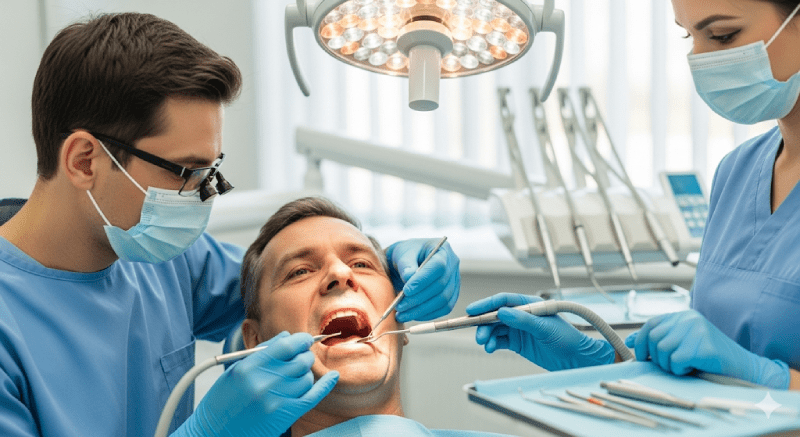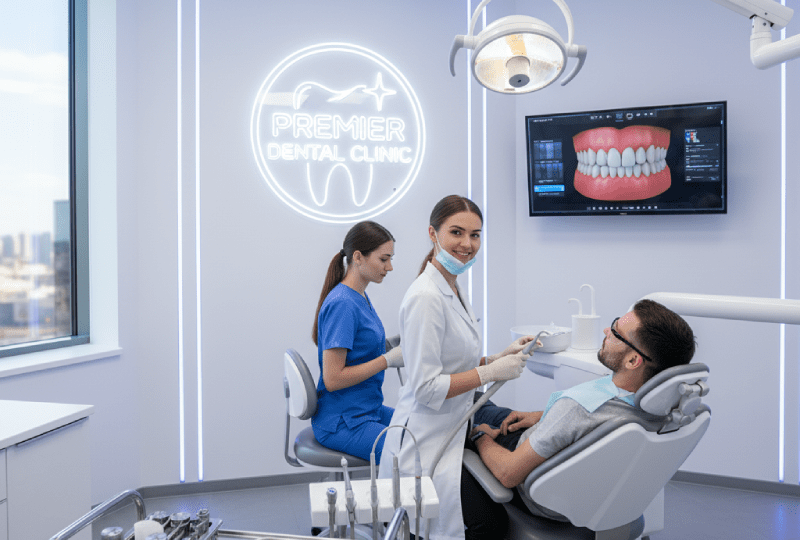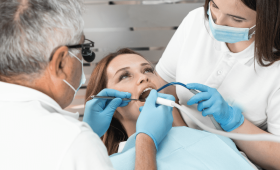What is the average cost of a dental implant in Rome?
The average cost of a single dental implant in Rome can range from €1,000 to €2,500, depending on the clinic’s location, the quality of the materials used, and the dentist’s experience. This price covers the implant itself, the abutment placed on the implant, and finally, the dental crown. However, if the patient’s bone structure is not suitable or if additional procedures (such as sinus lifting, bone grafting) are needed, the total cost can increase. Clinics in the city center generally offer higher prices.
What are the best cities in Italy for getting implants?
Throughout Italy, there are many qualified clinics that provide dental implant services. Large cities like Rome and Milan are popular due to their wide range of clinic options and advanced technology. High-standard clinics can also be found in cities like Bologna and Florence. Although prices may vary slightly from city to city, the general quality of service in Italy is high.
What are the prices of dental implants in Turkey?
Turkey is a very attractive destination for dental tourism, and dental implant prices are significantly lower compared to Italy. The average cost of a single dental implant can range from €400 to €1,000. The main reasons for this lower cost include the exchange rate difference, lower operational expenses, and government support for health tourism. Turkish dentists have also received international-standard training and gained experience.
What is the reason for the low cost in Turkey?
There are several reasons for the low prices of dental implants in Turkey. One of the most important factors is the Turkish Lira’s lower value against the Euro and Dollar. Additionally, the operational and personnel costs for clinics and dentists are lower compared to European countries. The high interest in health tourism in Turkey also increases competition, helping to keep prices at more affordable levels.
Is there a difference between implant brands in Italy and Turkey?
Both Italy and Turkey widely use globally recognized, high-quality implant brands (e.g., Straumann, Nobel Biocare, Astra Tech). While Italian clinics often use local and EU-approved brands, Turkish clinics can also offer the same global brands to their patients at more affordable costs. The quality of the brand used is critically important for the success and longevity of the implant.
What are the advantages of getting an implant in Italy?
One of the biggest advantages of getting an implant in Italy is receiving service that complies with the European Union’s strict health and safety standards. This provides a high level of assurance during and after the treatment process. Additionally, for patients living in Europe, the shorter travel time and less of a language barrier are significant advantages. Many Italian clinics have English-speaking staff.
What are the advantages of getting an implant in Turkey?
The most obvious advantage of getting dental implant treatment in Turkey is, without a doubt, the cost. Treatment expenses can be more than 50% lower compared to Italy. Despite the low prices, many clinics in Turkey use state-of-the-art equipment and work with expert dentists. Furthermore, it offers the opportunity for a cultural trip along with the treatment process.
What are the disadvantages of getting an implant in Italy?
The biggest disadvantage of getting implant treatment in Italy is the high cost. In addition to the treatment, accommodation and travel expenses can also be a burden on the budget. Since prices are higher than in Turkey, a significant cost difference emerges, especially for patients who need more than one implant. Also, appointment times can sometimes be longer, and there can be a high patient volume.

What are the disadvantages of getting an implant in Turkey?
There can be some potential disadvantages to receiving dental treatment in Turkey. For patients traveling from Europe, long flight times and travel expenses may be a factor. The language barrier could be a problem for some smaller clinics. Although the quality is generally high, clinic selection should be done carefully. Finding a reliable clinic with good references is vital for the success of the treatment.
What procedures are applied for a dental implant in Italy?
Dental implant treatment in Italy generally begins with a detailed examination and radiological imaging (panoramic X-ray or CBCT). The first stage involves a surgical procedure to place the implant in the jawbone. In the second stage, a waiting period of a few months is observed for the implant to fuse with the bone (osseointegration). Finally, the abutment and prosthesis (crown) are placed on the implant.
What procedures are applied for a dental implant in Turkey?
Dentists in Turkey, like their colleagues in Italy, follow international standards in dental implant treatment. The treatment process starts with a comprehensive intraoral examination, 3D tomography, and digital planning. In the surgical stage, a titanium implant is placed into the jawbone. A specific waiting period for bone healing and implant fusion passes. At the end of this process, the permanent crown is mounted on the implant.
How long does implant treatment take in Italy?
The duration of dental implant treatment in Italy varies depending on the patient’s condition and the procedures applied. The surgical stage for a single implant usually takes one hour. The bone healing process can take between 3 to 6 months, varying from patient to patient. After this waiting period, the crown’s creation and placement are completed within a few weeks. The total process can take approximately 4 to 8 months.
How long does implant treatment take in Turkey?
The duration of dental implant treatment in Turkey is similar to Italy’s, as it is subject to the same biological rules. The implant placement is completed within a few hours. A waiting period of 3 to 6 months is observed for bone healing and implant fusion (osseointegration). However, many Turkish clinics try to make the process more efficient to suit patients’ travel plans. Therefore, sometimes plans are made to place the implant during the first visit and attach the crown during a second visit.
What materials are used for implants in Italy?
In Italy, dental implants are generally made of titanium, a biocompatible and durable metal. Titanium is preferred because it provides excellent compatibility with the human body and can easily integrate with bone. In some cases, zirconia implants are also used for patients with aesthetic concerns. Zirconia is an ideal option for patients with metal allergies or thin gum tissue.
What materials are used for implants in Turkey?
Clinics in Turkey, like those in Italy, also predominantly prefer titanium implants. Titanium’s lightness, strength, and biocompatibility make it the most commonly used material. In recent years, the demand for zirconia implants has also increased. Zirconia is considered a more aesthetically superior option as it does not create a gray shadow at the gum line.
Is a visa required for getting a dental implant in Italy?
A Schengen visa is generally required for non-EU citizens traveling to Italy. Although there is no specific visa category for medical travel, it is important to provide documents proving your purpose of travel (such as an appointment letter from the clinic, treatment plan) during the visa application. Turkish citizens traveling to Italy generally need to obtain a short-term Schengen visa.
Is a visa required for getting a dental implant in Turkey?
For most patients from European Union countries traveling to Turkey for dental implant treatment, a visa is not required. European Union citizens can enter Turkey visa-free with their passports and stay for a certain period. The visa policy may differ for citizens of other countries. It is important to check the current visa requirements before traveling to Turkey.
How to choose a dental implant clinic in Italy?
When choosing a dental implant clinic in Italy, it is important to research the dentist’s specialization and experience. The technology used by the clinic and the implant brands should also be checked. Patient reviews and references provide important information about the clinic’s quality. Additionally, a detailed explanation of the treatment plan and transparent costs are critical factors for making the right choice.
How to choose a dental implant clinic in Turkey?
To find a reliable dental implant clinic in Turkey, it is useful to first review online patient reviews and clinic websites. It is important to check if the clinic has international accreditations, the implant brands it uses, and the dentists’ resumes. Clinics that offer digital consultation services before treatment can help better understand the patient’s expectations.
What are the payment options for implant treatment in Italy?
Many dental clinics in Italy offer various payment options for implant treatment. Generally, upfront payment, credit card, or bank transfer are accepted. Some clinics may also offer installment options or financing plans to make the patient’s budget more manageable. It is best to request detailed information on this from the clinic when creating the treatment plan.
What are the payment options for implant treatment in Turkey?
Clinics in Turkey offer flexible payment options for international patients. Payments are generally made by cash, credit card, or bank transfer. Foreign currencies like Euro or Dollar may also be accepted. Many clinics may also offer various financing and installment options to facilitate the treatment process. It is important to get clear information about the payment plan before starting treatment.
How often are follow-up appointments after an implant in Italy?
After implant treatment in Italy, regular follow-up appointments determined by the dentist are important. Generally, several follow-up sessions are planned within the first year. During these checks, the condition of the implant, gum health, and overall oral hygiene are evaluated. In the long term, a regular check-up at least once a year is recommended to maintain the health of the implant.
How often are follow-up appointments after an implant in Turkey?
In Turkey, regular follow-ups are also critical for the success of implant treatment. Turkish clinics generally schedule follow-up appointments within the first six months after implant placement. For patients coming from abroad, these checks can be scheduled according to their travel plans or they might be advised to cooperate with a local dentist. The important thing is that the health of the implant is regularly monitored.
Are dentists in Italy experienced enough?
Dentists in Italy must comply with the strict education and licensing requirements of the European Union. Many have received additional training to specialize in dental implantology. Italian universities have high standards for dental education. Therefore, it can be said that dentists in Italy are generally highly experienced and qualified.
Are dentists in Turkey experienced enough?
Dental education in Turkey is also at an international standard, with many universities offering prestigious programs in this field. Dentists in major cities like Istanbul and Ankara, in particular, are specialized in implantology and continuously update their knowledge by participating in international conferences. Therefore, it can be said that dentists in Turkey are also highly experienced and competent.
Is there a warranty for implants in Italy?
Many dental clinics in Italy offer a certain warranty period for implant treatment. This warranty usually covers the implant itself (the titanium screw) and sometimes the prosthesis (crown) placed on it. Warranty terms vary depending on the clinic and the implant brand used. It is important to request the warranty terms and coverage in writing before starting treatment.

Is there a warranty for implants in Turkey?
Most reliable clinics in Turkey, since they use internationally valid implant brands, generally offer a lifetime warranty. For the prosthesis (crown), a warranty period of several years may be given. The warranty terms provide for free replacement or repair in case of issues like a broken or dislodged implant. However, problems caused by patient factors, such as poor oral hygiene, are usually not covered by the warranty.
Is implant treatment a painful process?
Since dental implant treatment is performed under local anesthesia, the patient does not feel any pain during the surgical stage. After the procedure, slight swelling and pain may be felt, but this can usually be easily managed with pain medication. Thanks to modern dental technology, post-operative pain and discomfort are minimized.
What radiological imaging methods are used for implant treatment?
Various radiological imaging methods are used for accurate planning in implant treatment. The most common is a panoramic X-ray, which provides a general view of the entire mouth. However, for the most precise measurements and bone density analysis, cone beam computed tomography (CBCT) is used. This method provides the dentist with a 3D image to help determine the most suitable position for the implant.
When is bone grafting necessary?
Bone grafting is a procedure required when there is insufficient bone volume or density in the area where the implant will be placed. Bone loss can occur for various reasons (such as a long-missing tooth, periodontal disease). Bone grafting ensures the implant sits on a solid foundation and is vital for the success of the treatment. This procedure can be done before or sometimes at the same time as implant surgery.
What does sinus lifting mean?
Sinus lifting (sinus augmentation) is a surgical procedure applied when there is insufficient bone height in the area of the molar teeth in the upper jaw. This area contains air spaces called the maxillary sinuses. To prevent the implant from entering the sinus and to ensure it can be safely placed, the sinus floor is gently raised, and bone graft material is placed in the resulting space.
What is the lifespan of a dental implant?
Dental implants can last a lifetime with proper oral hygiene and regular dental check-ups. Factors affecting the success of the implant include the patient’s overall health, smoking habits, and attention to oral hygiene. The crown, which is the upper part of the implant, may wear out over time and may need to be replaced after 10-15 years.
What is the success rate of implant treatment?
The success rate of dental implant treatment is quite high globally. It is generally over 95%. The success rate depends on the patient’s general health, the dentist’s experience, the quality of the implant brand used, and the patient’s attention to post-operative care.
Can everyone get implant treatment?
Suitable candidates for dental implant treatment are generally individuals with sufficient bone structure and healthy gums. The success rate may decrease in people with chronic diseases such as diabetes or osteoporosis, or who smoke. Therefore, a comprehensive examination and evaluation are essential before treatment. Treatment may be postponed for pregnant women and patients taking certain medications.
What should be paid attention to after an implant?
For the first few days after implant surgery, it is important to eat soft foods and avoid hot beverages. Oral hygiene should be maintained, but direct brushing of the surgical site should be avoided. The dentist may recommend using mouthwashes. Smoking and alcohol consumption should be avoided as they negatively affect the healing process.
What technologies are used in implant treatment?
Modern implantology utilizes many advanced technologies to increase patient comfort and treatment success. Digital tomography (CBCT) for 3D imaging, computer-aided surgery (CAD/CAM), laser-assisted procedures, and digital planning software allow for the most accurate placement of the implant. These technologies are used in many clinics in both Italy and Turkey.



